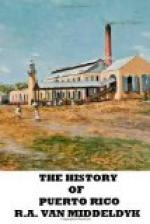In 1854 General Norzagery, then governor, assisted by Andres Vina, the secretary of the Royal Board of Commerce and Industry, had founded a school of Commerce, Agriculture, and Navigation. After sixteen years of existence, this establishment was unfavorably reported upon by Governor Sanz, who wished to suppress it on account of the liberal ideas and autonomist tendencies of its two principal professors, Jose Julian Acosta (Abbad’s commentator) and Ramon B. Castro. In the preamble to a secret report sent by this governor to Madrid he says: “This supreme civil government has always secured professors who, in addition to the required ability for their position, possess the moral and political character and qualities to form citizens, lovers of their country, i.e., lovers of Puerto Rico as a Spanish province, not of Puerto Rico as an independent state annexed to North America.”
Female education had all along received even less attention than the education of boys. Alexander Infiesta, in an article on the subject published in the Revista in February, 1888, states, that according to the latest census there were 399,674 females in the island, of whom 293,247 could neither read nor write, 158,528 of them being white women and girls. The number of schools for boys was 408, with an attendance of 18,194, and that for girls 127, with 7,183 pupils.
From the memorial published by the Director of the Provincial Institute for Secondary Education, regarding the courses of study in that establishment during the year 1888-’89, we learn that the number of primary schools in the island had increased to 600, but, according to Mr. Coll y Toste’s Resena, published in 1899, there were, among a total population of 894,302 souls, only 497 primary schools in the island at the time of the American occupation. The total attendance was 22,265 pupils, 15,108 boys and 7,157 girls.
FOOTNOTES:
[Footnote 77: See Franco del Valle Atiles, Causas del atras Intellectual del campesino Puertoriqueno. Revista Puertoriquena, Ano II, tomo II, p. 7.]
[Footnote 78: Letter to Dr. Rufo Fernandez from Fray Angel de la Concepcion Vazquez. See Acosta’s notes to Abbad’s history, pp. 412, 413, foot note.]
CHAPTER XXXVI
LIBRARIES AND THE PRESS
Books for the people were considered by the Spanish colonial authorities to be of the nature of inflammable or explosive substances, which it was not safe to introduce freely.
From their point of view, they were right. The Droits de l’homme of Jean Jacques Rousseau, for example, translated into every European language, had added more volunteers of all nationalities to the ranks of the Spanish-American patriots than was generally supposed—and so, books and printing material were subjected to the payment of high import duties, and a series of annoying formalities, among which the passing of the political and ecclesiastical censors was the most formidable.




